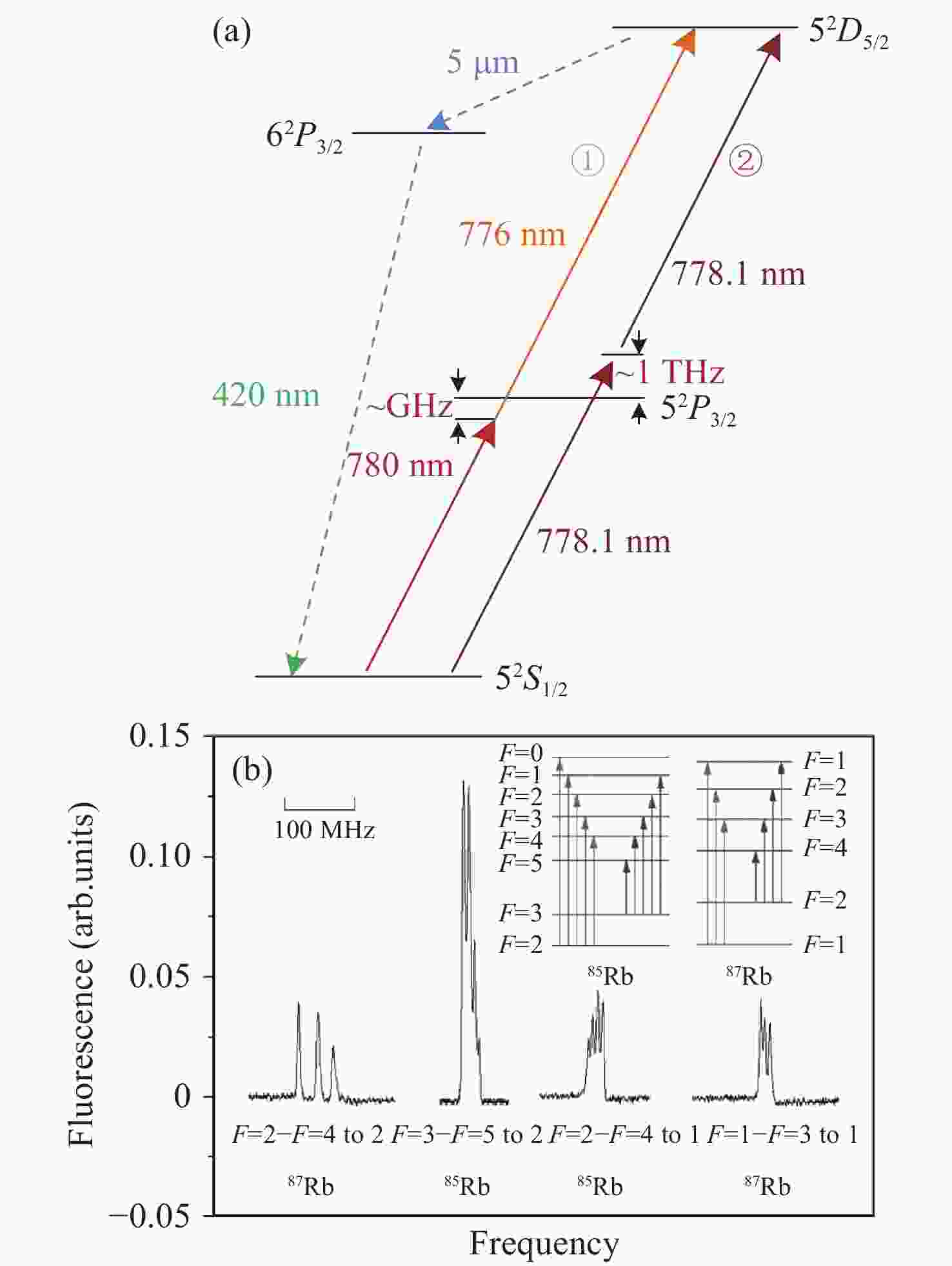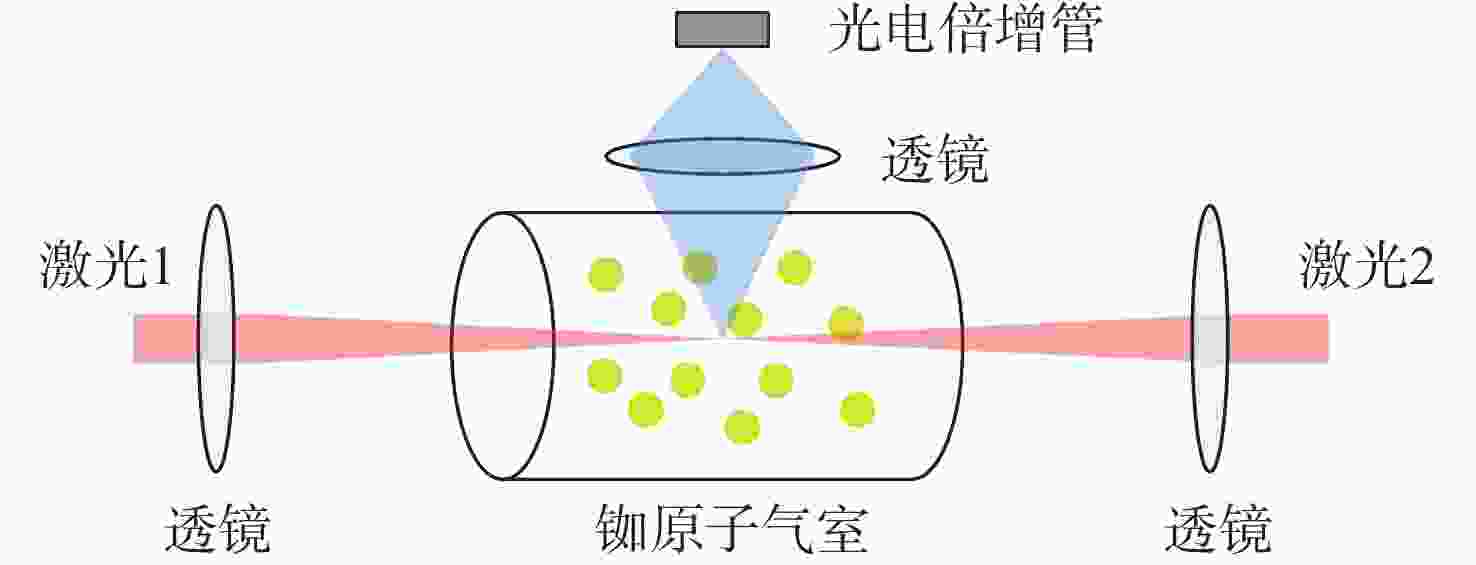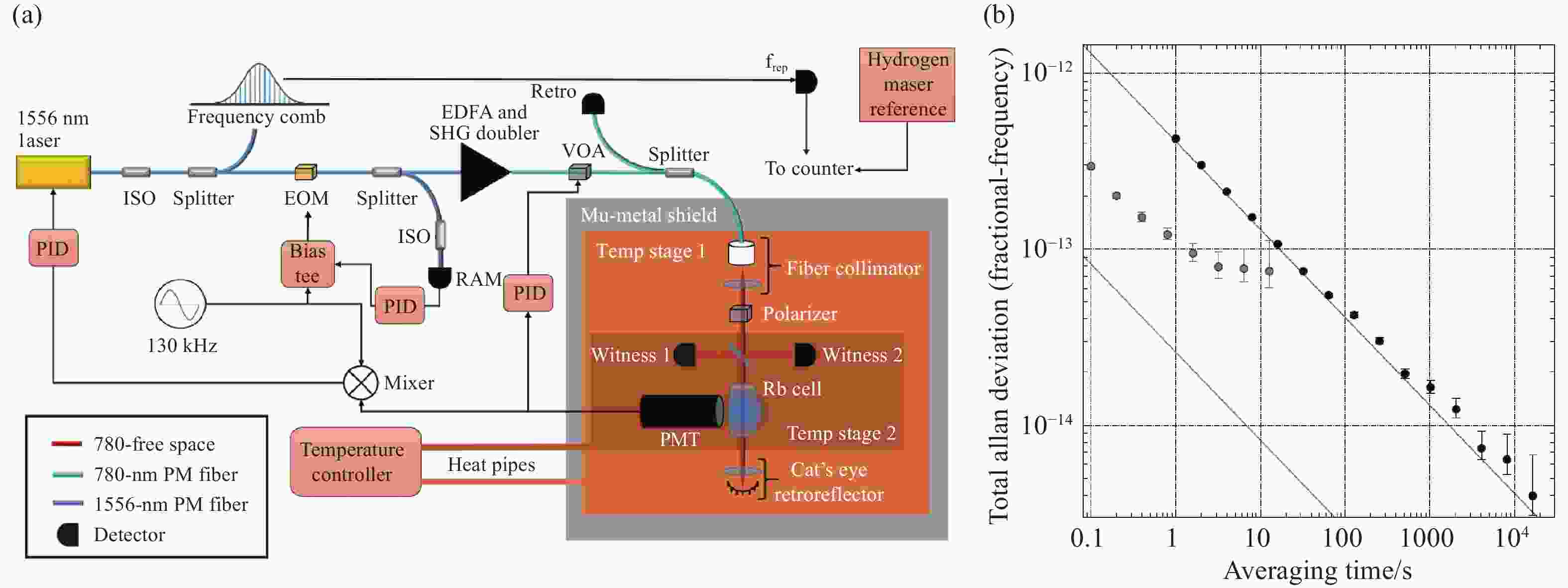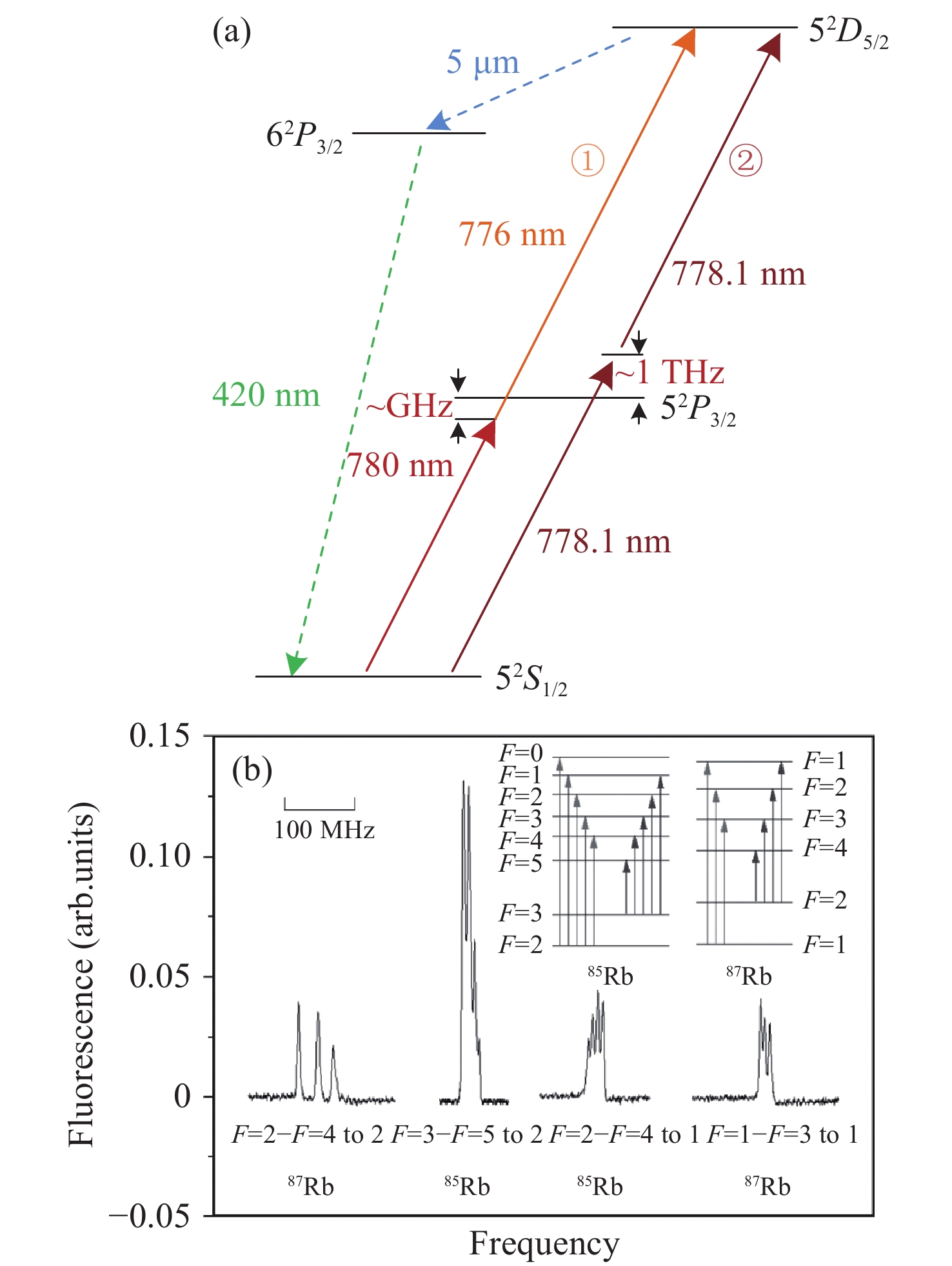-
摘要:
基于双光子跃迁的光学频率标准因其稳定度高、复现性好和易于小型化等显著优势,有望成为实际可用的小型化光频标。本文简要阐述了双光子跃迁的基本原理,介绍了国内外基于双光子跃迁的铷原子光频标的研究现状和进展,最后分析得出未来基于双光子跃迁的铷原子光学频率标准的发展趋势为系统小型化、性能指标提升以及集成应用与工程化。
Abstract:The optical frequency standard based on two-photon transition is expected to become a practical miniaturized optical frequency standard due to its significant advantages such as high stability, good reproducibility and easy miniaturization. In this paper, the basic principle of two-photon transition is briefly described, and the research status and progress of rubidium atomic optical frequency standards based on two-photon transition at home and abroad are introduced. Finally, it is concluded that the future development trends of rubidium atomic optical frequency standards based on two-photon transition are system miniaturization, performance improvement, integrated application and engineering.
-
Key words:
- two-photon transition /
- optical frequency standard /
- stability /
- miniaturization
-
表 1 国内外具有代表性双光子跃迁光频标研究现状
Table 1. Research status of representative optical frequency atomic clocks based on two-photon transition at home and abroad
国家 研究机构 年份 秒稳 (×10−13) 长稳 (×10−15) 文献 法国 LKB等 1998 3 10@1000 s [54] 美国 AFRL等 2018 4 4@10000 s [55] NIST 2019 44 220@1000 s [82] 2021 1.8 5@1600 s [81] 贝塞尔大学 2022 5 3@106s [95] 加拿大 拉瓦尔大学 2002 2.5 58@100 s [74] 英国 NPL 2005 9.3 120@100 s [75] 埃及 国家标准研究院 2016 40 680@1000 s [79] 澳大利亚 阿德莱德大学等 2023 1.5 3@8000 s [85] 中国 北京大学 2019 14 40@2000 s [88] 中科院上海光机所 2023 15 290@500 s [57] 中科院武汉精测院 2024 4 70@100 s [89] -
[1] BOTHWELL T, KENNEDY C J, AEPPLI A, et al. Resolving the gravitational redshift across a millimetre-scale atomic sample[J]. Nature, 2022, 602(7897): 420-424. doi: 10.1038/s41586-021-04349-7 [2] ASHBY N, HEAVNER T P, JEFFERTS S R, et al. Testing local position invariance with four cesium-fountain primary frequency standards and four NIST hydrogen masers[J]. Physical Review Letters, 2007, 98(7): 070802. doi: 10.1103/PhysRevLett.98.070802 [3] 孙和平, 杨元喜, 叶朝辉, 等. 精密(量子)测量时代下时空基准研究中的关键科学问题和核心技术[J]. 中国科学基金,2024,38(1):172-181.SUN H P, YANG Y X, YE ZH H, et al. Key scientific frontiers and core technologies in space-time reference research in the era of precision (quantum) measurement[J]. Bulletin of National Natural Science Foundation of China, 2024, 38(1): 172-181. (in Chinese). [4] 杨元喜, 任夏, 贾小林, 等. 以北斗系统为核心的国家安全PNT体系发展趋势[J]. 中国科学: 地球科学,2023,66(5):929-938.YANG Y X, REN X, JIA X L, et al. Development trends of the national secure PNT system based on BDS[J]. Science China Earth Sciences, 2023, 66(5): 929-938. [5] 罗俊, 艾凌皓, 艾艳丽, 等. 天琴计划简介[J]. 中山大学学报(自然科学版),2021,60(1-2):1-19.LUO J, AI L H, AI Y L, et al. A brief introduction to the TianQin project[J]. Acta Scientiarum Naturalium Universitatis Sunyatseni, 2021, 60(1-2): 1-19. (in Chinese). [6] 谢军, 郑晋军, 张弓, 等. 卫星导航系统发展现状与未来趋势[J]. 前瞻科技,2022,1(1):94-111. doi: 10.3981/j.issn.2097-0781.2022.01.009XIE J, ZHENG J J, ZHANG G, et al. Development status and future trend of satellite navigation systems[J]. Science and Technology Foresight, 2022, 1(1): 94-111. (in Chinese). doi: 10.3981/j.issn.2097-0781.2022.01.009 [7] 翟浩, 廉吉庆. 原子钟性能对卫星导航系统定位精度的影响分析[J]. 导航定位与授时,2021,8(5):118-123.ZHAI H, LIAN J Q. Analysis of the influence of atomic clock performance on positioning accuracy of satellite navigation systems[J]. Navigation Positioning and Timing, 2021, 8(5): 118-123. (in Chinese). [8] 曹远洪, 杜润昌, 赵杏文, 等. 原子钟技术在电力系统应用——中国电力系统时间同步体系建设方案初探[C]. 第十二届中国卫星导航年会论文集——S05空间基准与精密定位, 中国卫星导航系统管理办公室学术交流中心, 2021: 8.CAO Y H, DU R CH, ZHAO X W, et al. Application of atomic clock technology in grid system —preliminary study on construction of time synchronization system in China grid[C]. The 12th China Satellite Navigation Annual Conference, China Satellite Navigation Office Academic Exchange Center, 2021: 8. (in Chinese). [9] 王勇征, 田映东, 彭刚, 等. 铯原子钟在通信网中的应用研究[J]. 数码设计,2021,10(1):59.WANG Y ZH, TIAN Y D, PENG G, et al. Research on the application of cesium atomic clock in communication network[J]. Digital Insige, 2021, 10(1): 59. (in Chinese). [10] SCHULDT T, DÖRINGSHOFF K, OSWALD M, et al. Absolute laser frequency stabilization for LISA[J]. International Journal of Modern Physics D, 2019, 28(12): 1845002. doi: 10.1142/S0218271818450025 [11] CUI J Q, MING G, WANG F, et al. Realization of a rubidium atomic frequency standard with short-term stability in 10−14 τ−1/2 level[J]. IEEE Transactions on Instrumentation and Measurement, 2024, 73: 1500507. [12] 崔敬忠, 杨坦, 张玲, 等. 真空环境下铷钟性能的研究[J]. 真空与低温,2016,22(5):271-274,295. doi: 10.3969/j.issn.1006-7086.2016.05.005CUI J ZH, YANG T, ZHANG L, et al. Study of the performance of rubidium frquency standard in vacuum environment[J]. Vacuum and Cryogenics, 2016, 22(5): 271-274,295. (in Chinese). doi: 10.3969/j.issn.1006-7086.2016.05.005 [13] JEANMAIRE A, ROCHAT P, EMMA F. Rubidium atomic clock for Galileo[C]. Proceedings of the 31th Annual Precise Time and Time Interval Systems and Applications Meeting, 1999: 627-636. [14] 陈江, 刘志栋, 王骥, 等. 一种超小型磁选态铯原子钟[J]. 时间频率学报,2022,45(1):9-14.CHEN J, LIU ZH D, WANG J, et al. Small compact magnetically state-selected cesium atomic clock[J]. Journal of Time and Frequency, 2022, 45(1): 9-14. (in Chinese). [15] 赵杏文, 韦强, 李东旭, 等. 激光抽运小型铯原子钟研制进展[J]. 时间频率学报,2022,45(1):1-8.ZHAO X W, WEI Q, LI D X, et al. Progress on optically pumped cesium beam frequency standard[J]. Journal of Time and Frequency, 2022, 45(1): 1-8. (in Chinese). [16] CHADSEY H, KUBIK A. Maintenance of HP 5071A primary frequency standards at USNO[C]. Proceedings of Precise Time Time Interval Syst. Appl. Meeting, 1997: 49-59. [17] 王骥, 黄良育, 陈江, 等. 磁选态铯原子频率标准技术研制进展[J]. 时间频率学报,2022,45(1):15-25.WANG J, HUANG L Y, CHEN J, et al. Progress on cesium atomic frequency standard with magnetic state-selection technology[J]. Journal of Time and Frequency, 2022, 45(1): 15-25. (in Chinese). [18] 何克亮, 张为群, 林传富. 主动型氢原子钟的研究进展[J]. 天文学进展,2017,35(3):345-366. doi: 10.3969/j.issn.1000-8349.2017.03.05HE K L, ZHANG W Q, LIN CH F. Progresses in researches of active hydrogen atomic clock[J]. Progress in Astronomy, 2017, 35(3): 345-366. (in Chinese). doi: 10.3969/j.issn.1000-8349.2017.03.05 [19] POLYAKOV V, TIMOFEEV Y, DEMIDOV N. Frequency stability improvement of an active hydrogen maser with a single-state selection system[C]. 2021 Joint Conference of the European Frequency and Time Forum and IEEE International Frequency Control Symposium, IEEE, 2021: 1-4. [20] 郑贺斐, 李晶, 冯克明, 等. 被动型氢原子钟单频调制的鉴频特性研究[J]. 中国激光,2018,45(3):0311001. doi: 10.3788/CJL201845.0311001ZHENG H F, LI J, FENG K M, et al. Frequency discrimination for passive hydrogen maser based on single frequency modulation[J]. Chinese Journal of Lasers, 2018, 45(3): 0311001. (in Chinese). doi: 10.3788/CJL201845.0311001 [21] WEYERS S, GERGINOV V, KAZDA M, et al. Advances in the accuracy, stability, and reliability of the PTB primary fountain clocks[J]. Metrologia, 2018, 55(6): 789-805. doi: 10.1088/1681-7575/aae008 [22] GUENA J, ABGRALL M, ROVERA D, et al. Progress in atomic fountains at LNE-SYRTE[J]. IEEE Transactions on Ultrasonics, Ferroelectrics, and Frequency Control, 2012, 59(3): 391-410. doi: 10.1109/TUFFC.2012.2208 [23] PELLE B, ARCHAMBAULT L, DESRUELLE B, et al. Cold-atom-based commercial microwave clocks at 1× 10−15 relative instability over more than one month[C]. 2022 Joint Conference of the European Frequency and Time Forum and IEEE International Frequency Control Symposium, IEEE, 2022: 1-4. [24] 陈伟亮, 刘昆, 郑发松, 等. 长期稳定度2.6×10−16的工程化高可靠铷原子喷泉钟[J]. 仪器仪表学报,2024,45(2):79-86.CHEN W L, LIU K, ZHENG F S, et al. Enineering highly reliable Rb fountain clock with a long-term instability of 2.6×10−16[J]. Chinese Journal of Scientific Instrument, 2024, 45(2): 79-86. (in Chinese). [25] 李慧, 杜远博, 刘洪力, 等. 用于本地时标系统的铯原子喷泉钟研制[J]. 华中科技大学学报(自然科学版),2022,50(9):23-29.LI H, DU Y B, LIU H L, et al. Development of cesium fountain clock as local precision time and frequency standard[J]. Journal of Huazhong University of Science and Technology (Nature Science Edition), 2022, 50(9): 23-29. (in Chinese). [26] LIU L, LU D SH, CHEN W B, et al. In-orbit operation of an atomic clock based on laser-cooled 87Rb atoms[J]. Nature Communications, 2018, 9(1): 2760. doi: 10.1038/s41467-018-05219-z [27] REN W, LI T, QU Q ZH, et al. Development of a space cold atom clock[J]. National Science Review, 2020, 7(12): 1828-1836. doi: 10.1093/nsr/nwaa215 [28] LIU P, MENG Y L, WAN J Y, et al. Scheme for a compact cold-atom clock based on diffuse laser cooling in a cylindrical cavity[J]. Physical Review A, 2015, 92(6): 062101. doi: 10.1103/PhysRevA.92.062101 [29] MENG Y L, JIANG X J, WU J, et al. Satellite-borne atomic clock based on diffuse laser-cooled atoms[J]. Frontiers in Physics, 2022, 10: 985586. doi: 10.3389/fphy.2022.985586 [30] ESNAULT F X, ROSSETTO N, HOLLEVILLE D, et al. HORACE: a compact cold atom clock for Galileo[J]. Advances in Space Research, 2011, 47(5): 854-858. doi: 10.1016/j.asr.2010.12.012 [31] BURT E A, PRESTAGE J D, TJOELKER R L, et al. Demonstration of a trapped-ion atomic clock in space[J]. Nature, 2021, 595(7865): 43-47. doi: 10.1038/s41586-021-03571-7 [32] 曹士英, 房芳. 秒定义变革及我国时间频率基准的发展和应对[J]. 信息通信技术与政策,2022,48(7):2-8. doi: 10.12267/j.issn.2096-5931.2022.07.001CAO SH Y, FANG F. Redefinition of unit of time and research progress of primary frequency standard in NIM[J]. Information and Communications Technology and Policy, 2022, 48(7): 2-8. (in Chinese). doi: 10.12267/j.issn.2096-5931.2022.07.001 [33] BOTHWELL T, KEDAR D, OELKER E, et al. JILA SrI optical lattice clock with uncertainty of 2.0×10−18[J]. Metrologia, 2019, 56(6): 065004. doi: 10.1088/1681-7575/ab4089 [34] MCGREW W F, ZHANG X, FASANO R J, et al. Atomic clock performance enabling geodesy below the centimetre level[J]. Nature, 2018, 564(7734): 87-90. doi: 10.1038/s41586-018-0738-2 [35] LI J, CUI X Y, JIA ZH P, et al. A strontium lattice clock with both stability and uncertainty below 5×10−18[J]. Metrologia, 2024, 61(1): 015006. doi: 10.1088/1681-7575/ad1a4c [36] BREWER S M, CHEN J S, HANKIN A M, et al. 27Al+ quantum-logic clock with a systematic uncertainty below 10−18[J]. Physical Review Letters, 2019, 123(3): 033201. doi: 10.1103/PhysRevLett.123.033201 [37] DIDDAMS S A, JONES D J, YE J, et al. Direct link between microwave and optical frequencies with a 300 THz femtosecond laser comb[J]. Physical Review Letters, 2000, 84(22): 5102-5105. doi: 10.1103/PhysRevLett.84.5102 [38] DEL’HAYE P, SCHLIESSER A, ARCIZET O, et al. Optical frequency comb generation from a monolithic microresonator[J]. Nature, 2007, 450(7173): 1214-1217. doi: 10.1038/nature06401 [39] GIORGI G, SCHMIDT T D, TRAINOTTI C, et al. Advanced technologies for satellite navigation and geodesy[J]. Advances in Space Research, 2019, 64(6): 1256-1273. doi: 10.1016/j.asr.2019.06.010 [40] POLI N, SCHIOPPO M, VOGT S, et al. A transportable strontium optical lattice clock[J]. Applied Physics B, 2014, 117(4): 1107-1116. doi: 10.1007/s00340-014-5932-9 [41] KONG D H, WANG ZH H, GUO F, et al. A transportable optical lattice clock at the national time service center[J]. Chinese Physics B, 2020, 29(7): 070602. doi: 10.1088/1674-1056/ab9290 [42] ZHANG H Q, HUANG Y, ZHANG B L, et al. Absolute frequency measurements with a robust, transportable 40Ca+ optical clock[J]. Metrologia, 2023, 60(3): 035004. doi: 10.1088/1681-7575/acd05d [43] 任洁, 谭巍, 郭峰, 等. 空间锶原子光钟磁场分析及主动补偿系统[J]. 光学 精密工程,2022,30(11):1337-1343. doi: 10.37188/OPE.20223011.1337REN J, TAN W, GUO F, et al. Magnetic field analysis and active compensation system for strontium optical lattice clock in space[J]. Optics and Precision Engineering, 2022, 30(11): 1337-1343. (in Chinese). doi: 10.37188/OPE.20223011.1337 [44] DÖRINGSHOFF K, GUTSCH F B, SCHKOLNIK V, et al. Iodine frequency reference on a sounding rocket[J]. Physical Review Applied, 2019, 11(5): 054068. doi: 10.1103/PhysRevApplied.11.054068 [45] ZHANG ZH Q, WANG ZH Y, LIU H L, et al. An ultra-stable laser based on molecular iodine with a short-term instability of 3.3×10−15 for space based gravity missions[J]. Classical and Quantum Gravity, 2023, 40(22): 225001. doi: 10.1088/1361-6382/acfec2 [46] ZANG E J, CAO J P, LI Y, et al. Realization of four-pass I2 absorption cell in 532-nm optical frequency standard[J]. IEEE Transactions on Instrumentation and Measurement, 2007, 56(2): 673-676. doi: 10.1109/TIM.2007.890816 [47] DÖRINGSHOFF K, SCHULDT T, KOVALCHUK E V, et al. A flight-like absolute optical frequency reference based on iodine for laser systems at 1064 nm[J]. Applied Physics B, 2017, 123(6): 183. doi: 10.1007/s00340-017-6756-1 [48] LEE S, MOON G, PARK S E, et al. Laser frequency stabilization in the 10−14 range via optimized modulation transfer spectroscopy on the 87 Rb D2 line[J]. Optics Letters, 2023, 48(4): 1020-1023. doi: 10.1364/OL.480178 [49] ZHANG SH N, ZHANG X G, CUI J ZH, et al. Compact Rb optical frequency standard with 10−15 stability[J]. Review of Scientific Instruments, 2017, 88(10): 103106. doi: 10.1063/1.5006962 [50] QI X H, CHEN W L, LIN Y, et al. Ultra-stable rubidium-stabilized external-cavity diode laser based on the modulation transfer spectroscopy technique[J]. Chinese Physics Letters, 2009, 26(4): 044205. doi: 10.1088/0256-307X/26/4/044205 [51] KERSTEN P, MENSING F, STERR U, et al. A transportable optical calcium frequency standardDedicated to J. Helmcke on the occasion of his 60th birthday[J]. Applied Physics B, 1999, 68(1): 27-38. doi: 10.1007/s003400050582 [52] SHANG H S, ZHANG X G, ZHANG SH N, et al. Miniaturized calcium beam optical frequency standard using fully-sealed vacuum tube with 10−15 instability[J]. Optics Express, 2017, 25(24): 30459-30467. doi: 10.1364/OE.25.030459 [53] QUINN T J. Practical realization of the definition of the metre, including recommended radiations of other optical frequency standards (2001)[J]. Metrologia, 2003, 40(2): 103-133. doi: 10.1088/0026-1394/40/2/316 [54] HILICO L, FELDER R, TOUAHRI D, et al. Metrological features of the rubidium two-photon standards of the BNM-LPTF and Kastler Brossel Laboratories[J]. The European Physical Journal: Applied Physics, 1998, 4(2): 219-225. doi: 10.1051/epjap:1998263 [55] MARTIN K W, PHELPS G, LEMKE N D, et al. Compact optical atomic clock based on a two-photon transition in rubidium[J]. Physical Review Applied, 2018, 9(1): 014019. doi: 10.1103/PhysRevApplied.9.014019 [56] JANA S, SAHOO B K, SHARMA A. Progress towards the development of a portable all-optical atomic clock based on a two-photon transition in warm atomic vapor[C]. 2022 URSI Regional Conference on Radio Science, IEEE, 2022: 1-4. [57] 孟一鸣, 项静峰, 徐斌, 等. 铷87原子双光子跃迁光谱稳频特性研究[J]. 中国激光,2023,50(23):2301013.MENG Y M, XIANG J F, XU B, et al. Frequency stabilization characteristics of 87Rb two-photon transition spectrum[J]. Chinese Journal of Lasers, 2023, 50(23): 2301013. (in Chinese). [58] CHU C H, SHIH Y J, CHANG P CH, et al. Frequency of the unmodulated 778-nm rubidium clock measured in high vacuum[C]. 2023 Conference on Lasers and Electro-Optics, IEEE, 2023: 1-2. [59] NEZ F, PLIMMER M D, BOURZEIX S, et al. First pure frequency measurement of an optical transition in atomic hydrogen: better determination of the Rydberg constant[J]. Europhysics Letters, 1993, 24(8): 635-640. doi: 10.1209/0295-5075/24/8/003 [60] SCHWOB C, JOZEFOWSKI L, DE BEAUVOIR B, et al. Optical frequency measurement of the 2S-12D transitions in hydrogen and deuterium: rydberg constant and lamb shift determinations[J]. Physical Review Letters, 1999, 82(25): 4960-4963. doi: 10.1103/PhysRevLett.82.4960 [61] KIRAN KUMAR P V, SURYANARAYANA M V. Precision two-photon spectroscopy of alkali elements[J]. Pramana, 2014, 83(2): 189-219. doi: 10.1007/s12043-014-0789-3 [62] JADUSZLIWER B, CAMPARO J. Past, present and future of atomic clocks for GNSS[J]. GPS Solutions, 2021, 25(1): 27. doi: 10.1007/s10291-020-01059-x [63] VASILENKO L S, CHEBOTAEV V P, SHISHAEV A V. Line shape of two-photon absorption in a standing-wave field in a gas[J]. Journal of Experimental and Theoretical Physics Letters, 1970, 12(3): 113-116. [64] 冯晨, 吕杭哲, 段剑, 等. 基于双光子光谱的光学频率标准[J]. 计测技术,2023,43(4):103-112. doi: 10.11823/j.issn.1674-5795.2023.04.08FENG CH, LYU H ZH, DUAN J, et al. Optical frequency standard based on two-photon spectroscopy[J]. Metrology & Measurement Technology, 2023, 43(4): 103-112. (in Chinese). doi: 10.11823/j.issn.1674-5795.2023.04.08 [65] DEMTRÖDER W. Laser Spectroscopy 2: Experimental Techniques[M]. Berlin: Springer, 2008. [66] BIRABEN F, CAGNAC B, GRYNBERG G. Experimental evidence of two-photon transition without Doppler broadening[J]. Physical Review Letters, 1974, 32(12): 643-645. doi: 10.1103/PhysRevLett.32.643 [67] SHENG D, PÉREZ GALVÁN A, OROZCO L A. Lifetime measurements of the 5d states of rubidium[J]. Physical Review A, 2008, 78(6): 062506. doi: 10.1103/PhysRevA.78.062506 [68] 范鹏瑞, 李一鸿, 李少华, 等. 利用铷原子双光子跃迁产生420nm蓝光的实验研究[J]. 量子光学学报,2017,23(2):144-150.FAN P R, LI Y H, LI SH H, et al. Experimental investigation on the 420 nm blue light generated by two-photon transition of Rb[J]. Journal of Quantum Optics, 2017, 23(2): 144-150. (in Chinese). [69] LEVENSON M D, BLOEMBERGEN N. Observation of two-photon absorption without doppler broadening on the 3S-5S transition in sodium vapor[J]. Physical Review Letters, 1974, 32(12): 645-648. doi: 10.1103/PhysRevLett.32.645 [70] KATO Y, STOICHEFF B P. Two-photon absorption to highly excited D states of Rb atoms[J]. Journal of the Optical Society of America, 1976, 66(5): 490-492. doi: 10.1364/JOSA.66.000490 [71] NEZ F, BIRABEN F, FELDER R, et al. Optical frequency determination of the hyperfine components of the 5S12-5D32 two-photon transitions in rubidium[J]. Optics Communications, 1993, 102(5-6): 432-438. doi: 10.1016/0030-4018(93)90417-4 [72] FELDER R, TOUAHRI D, ACEF O, et al. Performance of a GaAlAs laser diode stabilized on a hyperfine component of two-photon transitions in rubidium at 778 nm[J]. Proceedings of SPIE, 1995, 2378: 52-57. doi: 10.1117/12.208244 [73] SHUKLA V, NATH S K, NAIK V, et al. Studies on rubidium 5S-5d two-photon absorption[J]. Journal of Modern Optics, 2021, 68(6): 311-321. doi: 10.1080/09500340.2021.1894361 [74] POULIN M, LATRASSE C, TOUAHRI D, et al. Frequency stability of an optical frequency standard at 192.6 THz based on a two-photon transition of rubidium atoms[J]. Optics Communications, 2002, 207(1-6): 233-242. doi: 10.1016/S0030-4018(02)01354-8 [75] EDWARDS C S, BARWOOD G P, MARGOLIS H S, et al. Development and absolute frequency measurement of a pair of 778 nm two-photon rubidium standards[J]. Metrologia, 2005, 42(5): 464-467. doi: 10.1088/0026-1394/42/5/018 [76] RIEHLE F. Frequency Standards: Basics and Applications[M]. Weinheim: Wiley-VCH, 2004. [77] ZHU M, STANDRIDGE R W. Optical frequency standard for optical fiber communication based on the Rb 5s→ 5d two-photon transition[J]. Optics Letters, 1997, 22(10): 730-732. doi: 10.1364/OL.22.000730 [78] AWAJI Y, NAKAGAWA K, DE LABACHELERIE M, et al. Optical frequency measurement of the H12C14N Lamb-dip-stabilized 1.5-μm diode laser[J]. Optics Letters, 1995, 20(19): 2024-2026. doi: 10.1364/OL.20.002024 [79] TERRA O, HUSSEIN H. An ultra-stable optical frequency standard for telecommunication purposes based upon the 5S1/2→5D5/2 two-photon transition in Rubidium[J]. Applied Physics B, 2016, 122(2): 27. doi: 10.1007/s00340-015-6309-4 [80] MAURICE V, NEWMAN Z L, DICKERSON S, et al. Miniaturized optical frequency reference for next-generation portable optical clocks[J]. Optics Express, 2020, 28(17): 24708-24720. doi: 10.1364/OE.396296 [81] NEWMAN Z L, MAURICE V, FREDRICK C, et al. High-performance, compact optical standard[J]. Optics Letters, 2021, 46(18): 4702-4705. doi: 10.1364/OL.435603 [82] NEWMAN Z L, MAURICE V, DRAKE T, et al. Architecture for the photonic integration of an optical atomic clock[J]. Optica, 2019, 6(5): 680-685. doi: 10.1364/OPTICA.6.000680 [83] COTE K, JACKSON S, ZAZO R, et al. The stratospheric optical rubidium clock experiment[C]. 70th International Astronautical Congress, IAF, 2019. [84] PERRELLA C, LIGHT P S, ANSTIE J D, et al. Dichroic two-photon rubidium frequency standard[J]. Physical Review Applied, 2019, 12(5): 054063. doi: 10.1103/PhysRevApplied.12.054063 [85] LOCKE C R, NG S, SCARABEL J, et al. Portable optical atomic clock based on a dichroic two-photon transition in rubidium[C]. 2023 Joint Conference of the European Frequency and Time Forum and IEEE International Frequency Control Symposium, IEEE, 2023: 1-2. [86] ZHANG S Y, WU J T, ZHANG Y L, et al. Direct frequency comb optical frequency standard based on two-photon transitions of thermal atoms[J]. Scientific Reports, 2015, 5: 15114. doi: 10.1038/srep15114 [87] WU J T, HOU D, QIN ZH Y, et al. Observation of Rb two-photon absorption directly excited by an erbium-fiber-laser-based optical frequency comb via spectral control[J]. Physical Review A, 2014, 89(4): 041402(R). [88] LENG J X, XU H, LU H Y, et al. Optical communication frequency standard using a fiber laser to excite cold rubidium two-photon transition[J]. Journal of the Optical Society of America B, 2019, 36(5): 1183-1188. doi: 10.1364/JOSAB.36.001183 [89] LI D, LIU K Q, WANG P F, et al. Dual-interrogation method for suppressing light shift in Rb 778 nm two-photon transition optical frequency standard[J]. Optics Express, 2024, 32(2): 2766-2773. doi: 10.1364/OE.512205 [90] 王铿淇, 郭进先. 基于铷原子双光子跃迁的原子谱线展宽机制教学演示[J]. 物理与工程,2023,33(2):119-125. doi: 10.3969/j.issn.1009-7104.2023.02.019WANG K Q, GUO J X. Teaching demonstration of spectrum broadening in two-photo transition of RB[J]. Physics and Engineering, 2023, 33(2): 119-125. (in Chinese). doi: 10.3969/j.issn.1009-7104.2023.02.019 [91] ZHANG Y CH, WU J ZH, LI Y Q, et al. A direct frequency comb for two-photon transition spectroscopy in a cesium vapor[J]. Chinese Physics B, 2012, 21(11): 113701. doi: 10.1088/1674-1056/21/11/113701 [92] ZHANG Y CH, FAN P R, YUAN J P, et al. High-resolution rb two-photon transition spectroscopy by a femtosecond frequency comb via pulses control[J]. Chinese Physics Letters, 2016, 33(11): 113201. doi: 10.1088/0256-307X/33/11/113201 [93] AFRL. Navigation technology satellite-3 (NTS-3) [EB/OL]. [2024-06-28]. https://afresearchlab.com/technology/nts-3. [94] LEMKE N D, PHELPS G, BURKE J H, et al. The optical rubidium atomic frequency standard at AFRL[C]. 2017 Joint Conference of the European Frequency and Time Forum and IEEE International Frequency Control Symposium, IEEE, 2017: 466-467. [95] LEMKE N D, MARTIN K W, BEARD R, et al. Measurement of optical rubidium clock frequency spanning 65 days[J]. Sensors, 2022, 22(5): 1982. doi: 10.3390/s22051982 [96] GERGINOV V, BELOY K. Two-photon optical frequency reference with active ac Stark shift cancellation[J]. Physical Review Applied, 2018, 10(1): 014031. doi: 10.1103/PhysRevApplied.10.014031 [97] NGUYEN T N, SCHIBLI T R. Temperature-shift-suppression scheme for two-photon two-color rubidium vapor clocks[J]. Physical Review A, 2022, 106(5): 053104. doi: 10.1103/PhysRevA.106.053104 [98] 薛文祥, 陈江, 杜志静, 等. 温度对POP Rb原子钟性能影响的研究[J]. 时间频率学报,2012,35(3):129-136. doi: 10.3969/j.issn.1674-0637.2012.03.001XUE W X, CHEN J, DU ZH J, et al. Study of the temperature effect on POP Rb atomic clock[J]. Journal of Time and Frequency, 2012, 35(3): 129-136. (in Chinese). doi: 10.3969/j.issn.1674-0637.2012.03.001 [99] ROSLUND J D, CINGÖZ A, LUNDEN W D, et al. Optical clocks at sea[J]. Nature, 2024, 628(8009): 736-740. doi: 10.1038/s41586-024-07225-2 [100] 沈自才, 崔云, 牛锦超. 激光技术在航天工程中的应用及对策[J]. 红外与激光工程,2012,41(10):2703-2711. doi: 10.3969/j.issn.1007-2276.2012.10.028SHEN Z C, CUI Y, NIU J CH. Applications and countermeasures of laser technology in space engineering[J]. Infrared and Laser Engineering, 2012, 41(10): 2703-2711. (in Chinese). doi: 10.3969/j.issn.1007-2276.2012.10.028 -






 下载:
下载:





